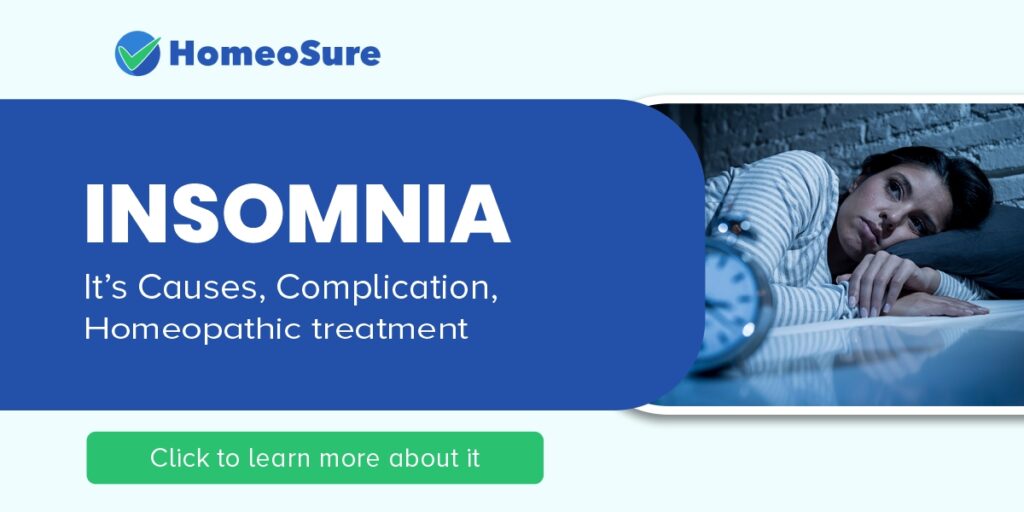Insomnia
Insomnia is a condition that causes either difficulty in falling asleep or staying asleep. It is associated with poor sleep quality. Usually, most of the time, affected person does not feel sleepy easily, in spite of having time to sleep. Even if he is able to fall asleep, sleep may get disturbed in between and there could be difficulty in falling asleep again.
Insomnia can affect anybody but it is commonly seen in elderly. It also affects women during their hormonal changes during menstrual cycle and at menopause.
An average person spends about one third of his life sleeping. Normally people (adults) require about 7-9 hours of sound sleep to function well but some people can do very well even with 4-5 hours of sleep.
Lack of sleep can cause day time sleepiness, drowsiness, fatigue, restlessness, poor appetite, irritation, poor memory, lack of concentration. It can affect job or school performances, driving abilities, analytical and decision making skill of person. Lack of inability to get up in morning and daytime sleepiness can affect work or studies significantly.
Insomnia also increases the risk of systemic diseases like hypertension, diabetes, heart diseases, psychiatric disease. In long term, Insomnia can elevate the level of stress too much and may cause anxiety and depression.
CAUSES OF INSOMNIA
Sometimes, insomnia only lasts a few days and goes away on its own, especially when the insomnia is tied to an obvious temporary cause, such as stress over an upcoming presentation or a painful breakup. Chronic insomnia, however, is usually tied to an underlying psychological or medical issue.
- Psychological problems and emotional distress: Anxiety and depression are two of the most common causes of chronic insomnia. Other common emotional and psychological causes include chronic or significant life stress, anger, worry, grief, bipolar disorder, and trauma
- Medical problems or illness: Many medical conditions and diseases can contribute to insomnia, including asthma, allergies, Parkinson’s disease, hyperthyroidism, acid reflux, kidney disease, and cancer. Chronic pain is also a very common cause of insomnia
- Medications: Many prescription drugs can interfere with sleep, including antidepressants, stimulants for ADHD, corticosteroids, thyroid hormone, high blood pressure medications, and some contraceptives
- Sleep disorders: Insomnia is itself a sleep disorder, but it can also be a symptom of other sleep disorders, including sleep apnea, restless legs syndrome, and circadian rhythm disturbances tied to jet lag or late-night shift work
LIFESTYLE RELATED CAUSES
- Sleep environment being noisy, too bright, or not very comfortable
- Watching TV, play video games, or use a computer, tablet or smartphone in bed
- Drinking caffeinated beverages (coffee, tea, soda) within eight hours of bed
- Irregular sleep schedule
- Exercise or eating late in the evening
- Using alcohol to fall asleep
MANAGING INSOMNIA
- Using a sleep diary to identify insomnia-inducing habits
- Adopting new habits to help you sleep
- Stick to a regular sleep schedule
- Avoid short naps
- Limit caffeine, alcohol, and nicotine
- Avoid late meals
- Get regular exercise
- Develop a better bedtime routine
- Make sure your bedroom is quiet, dark, and cool. Noise, light, and heat can interfere with sleep
- Avoid stimulating activity and stressful situations before bedtime
- Turn off screens one hour before sleep.
HOMEOPATHIC TREATMENT
Homeopathic treatment is targeted towards UPROOTING THE DISEASE and ensuring health with no side effects. For prescribing to an individual, a PLAN OF TREATMENT is followed which involves:
- GETTING THOROUGH UNDERSTANDING OF CASE which includes complete case taking (analyzing patient as an individual) along with patient history and family history
- DIAGNOSIS OF PATIENT AND DISEASE
- INDIVIDUAL ASSESSMENT OF THE CASE
- PRESCRIBING THE MOST SUITABLE INDIVIDUAL CONSTITUTIONAL REMEDY
